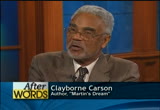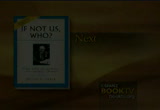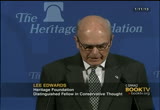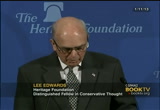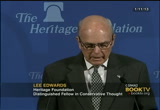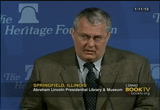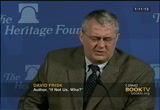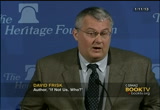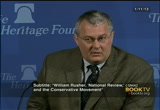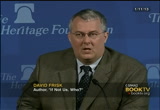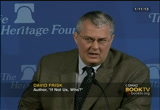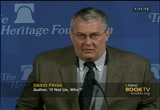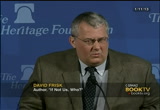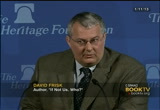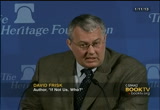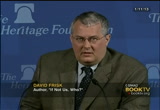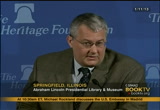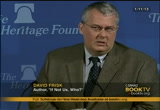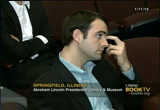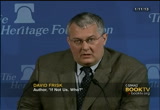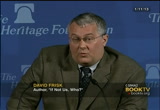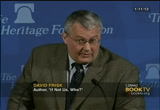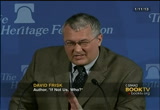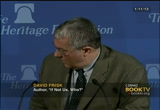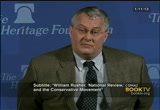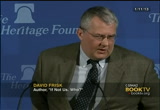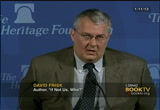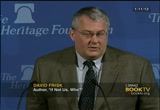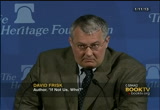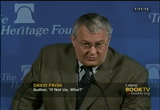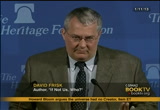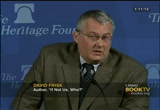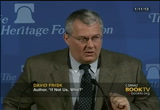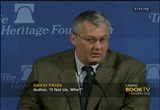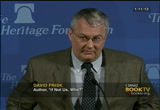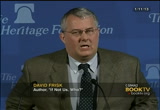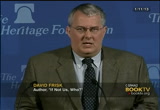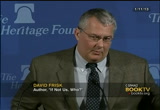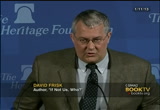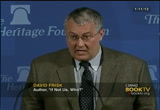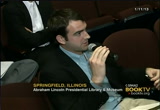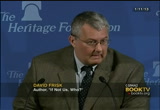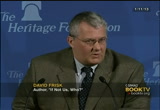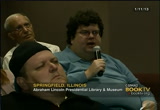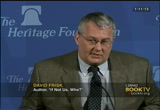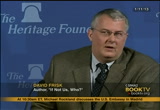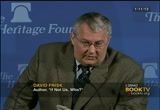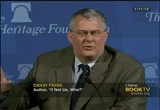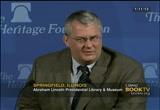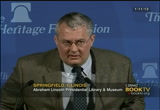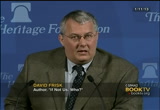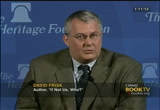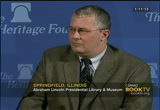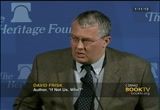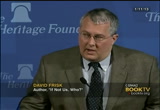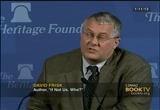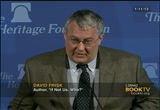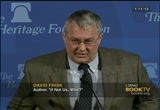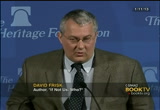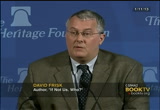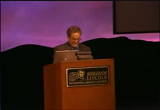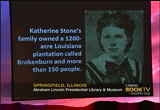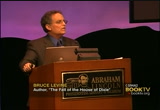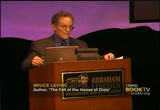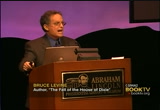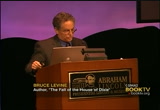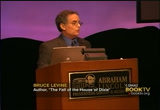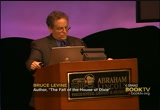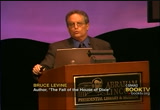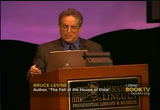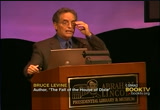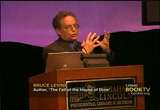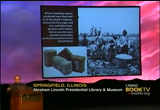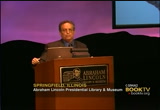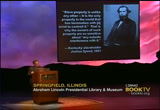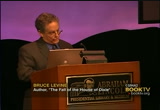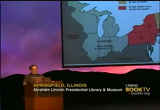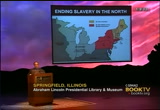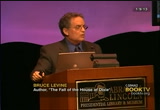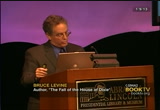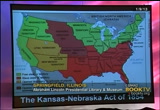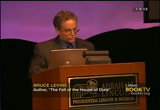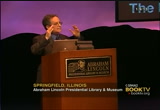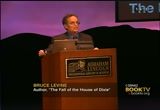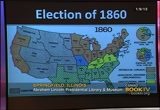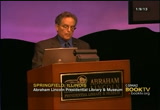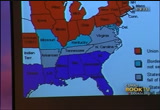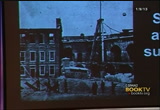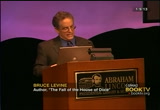tv Book TV CSPAN January 19, 2013 8:00pm-9:30pm EST
8:00 pm
8:01 pm
there were two bills at national review and in the conservative movement, two bills. bill buckley concha a brilliant shooting star who lit up the sky and bill rusher, and never wavering northstar by which conservatives learned to chart their political course. now many have written about william f. buckley junior, ' irresistible renaissance man but no one until david frisk has given us an in-depth portrait of the other bill, william a. rusher among his other salutary -- played a pivotal role in the life of the national draft goldwater committee and that was critical, because if there had been no draft goldwater committee there would have been no presidential candidate barry
8:02 pm
goldwater in 1964. and if there had been no candidate goldwater in 1964, there would have been no president-elect ronald reagan in 1980. it was goldwater you see who approved reagan's famous a time for choosing television address which made reagan a political star overnight and led to his running for governor of california and eventually president of these united states. david recounts how bill rusher shored up the goldwater committee when money ran short and spirits sagged. skillfully guided young americans for freedom in its early chaotic days and in for some order of discipline on the spirit to read national review, expanded the conservative movement through the tv program the epic it's, his newspaper column and his lectures in
8:03 pm
champion ronald reagan when other conservatives were somewhat skeptical about the act there turned politician. bill rusher loved american politics, rare wines, traveling to distant lands and national review's effervescent editor bill buckley of whom he once said quote the most exasperating people in the world are so often the most beloved, and he is no exception. now david frisk has captured all of this and more in this splendid overdue biography of the other bill, bill rusher. derf risk is a former award-winning reporter who received his ph.d. from claremont and will be teaching this fall those lucky students at the alexander hamilton center in new york. ladies and gentlemen, please join me in getting a warm
8:04 pm
heritage welcome to dr. david frisk. [applause] >> thank you for that wonderful introduction of me and more importantly william rusher. can everyone here all right? i suspect there is a very wide range in this room of familiarity and relative unfamiliarity with bill rusher who was the publisher of national review for 31 years, almost from the beginning and it can also be said to have had a half-century long career in american politics with something of a privileged ringside or front row seat.
8:05 pm
he never ran for public office, never held public office and never really founded anything on his own as a number of conservatconservat ive leaders did. never controlled his own institution. he was, as i they put it in my introduction, william rusher and the conservative movement published last april, he was at the edge of the limelight. a lot of people knew very well who he was. a lot of people know a lot less about him. but as people became aware of william rusher, there was a general agreement among the whole fractured spec from of american conservatism. we have seen how fractious it can be just after this unfortunate election.
8:06 pm
there was a white agreement. libertarians, traditionalist, purists, pragmatists that bill rusher really knew what he was doing. one of his great achievements was to give movement conservatives from i would say the early 1960s right up until the 1990s at which time he had semiretired, more confidence than i think he otherwise would have had that there really was a conservative movement and that it really was moving, if imperfectly. we have seen in recent years a lot of doubts about whether the conservative movement still exist anymore. some people even doubt whether it deserves to exist anymore, whether it's destroyed itself. well, there are people all along who it said insight that.
8:07 pm
one of the things rusher stood for most prominently and enduringly was the belief that we can serve -- conservatives all had to pull together and all had to be together and keep it being together. he would would have put a partiy and more member of mike. is to not let the perfect be the enemy of the good. not miss the forest for the trees. these are not the most innovating or exciting sort of messages but it's very important to have a few people at or near the top of the conservative movement's leadership who believe in and preach these things, and to ask people, asked their fellow activists and conservative intellectuals to
8:08 pm
remain focused on the need to win a majority of the american people and to govern the. "national review" as a very intellectual magazine throughout its existence and i think probably even more so in its early years in the 50s and 60's. a very much needed i think bill buckley managing editor and every other major person there acknowledge to that they very much needed a man just like bill rusher to serve as a lyrical eyes and ears, as a political counselor, as a link between "national review" type people.
8:09 pm
as rusher tended to put it, the intellectuals and the practical politician. by politicians rusher didn't mean people aspired to public office but the mastermind of the goldwater campaign and the marshal of the goldwater campaign. white too was a politician and rusher was something of a politician. in other words if practitioner of actual politics. russia placed tremendous value on these people, and he was always trying with some success to get the more philosophical conservatives. a classic example of course being buckley himself to appreciate that sort of career and that sort of individual and that sort of effort. a lot of what you'll find in the book and i'm sure some of you have read it, is a good deal of
8:10 pm
back and forth between publisher rusher and also political counselor rusher who have full privileges by the way of speaking out on any issue officially and unofficially. officially i mean the meetings they would hold what should be long and interesting. he had the privilege of speaking out on any editorial issue, anything involving "national review"'s political, will its tone and what should cover and what's less important so he played an editorial role although he didn't have the vision and they listen to it. at times they got tired of listening to it. but remember any time, if you read about rusher or if you want to formulate a question about it remember that this is another world technologically and remained so until rusher retired from "national review" at the end of the 1988. when he came right in right
8:11 pm
afterwards it was still operating in 1950s that is an 88 and 89 still operating in the 1950s with carbon paper and secretaries who were treated as secretaries. i guess that is a polite term for sexist and it's not an important point. the more important point is carbon paper. rusher would not have been keen on social media himself. where he still alive and onto today he would have appreciated it. to get back to the point comp that's an important one. this was a year the year when people communicated on paper and they communicated at length on paper. it was a tremendous resource for my research of the library congress where rusher's papers are. there has been sufficient evidence -- no excuse me sufficient interest in the rusher papers among scholars who were interested in the
8:12 pm
development of the conservative movement who i think more often than not are liberals. in the rusher papers they remove several years ago from the satellite location in suburban maryland to the actual james madison building on the other side of the hill. that is how much interest there has been in the rusher papers although he -- it might be the only book about it and as far as i know it may be the only book about him. so they committed to each other in paper and that is a lot of what my book is about plus other people and significant interviews with mr. buckley. they were very candid with each other. rusher and buckley in particular. in their differing judgments about what positions "national review" should take and what it should focus on. dr. edwards alluded to the importance of the goldwater campaign for the future of the conservative movement.
8:13 pm
i don't think there is time and perhaps isn't any need to stress that to this audience any further than it already has been. it was a very seminal event. rusher was in the thick of it. more than anyone, he probably persuaded goldwater to at least remain open to the possibility of a candidacy and early 63 when he did not want to. he kept the goldwater campaign going went ahead of it his friend and associate was ready to give up for a variety of reasons including financial reasons. one of the great lessons of rusher's career is that he didn't believe in giving up. ever. there was always another bus coming along in 10 or 15 minutes. the sun would come up the next morning. and there was always something to do.
8:14 pm
one of the people who knew rusher well as a young conservative activists in the 60s rusher being in his late 30s or about 40 said that it seemed to him in his interactions with him in young americans for freedom and so juan, that rusher had an extra 10 hours a day. someone else said that he seemed to be the most organized man in the movement. now, it was a little easier for rusher to play that kind of very energetic and very focused role, always on all the time, always giving it his best, always looking good always speaking well and always dressing well. and if not always write, always persuasive, always somebody
8:15 pm
wanted to listen to. it's easier to develop that reputation perhaps if you don't have a family. he never married, never had children. somebody suggested to me early in my research that rusher was married to the movement and i think there was a significant truth to that so there is only a limited number of people who would have that kind of a life and could play quite that kind of a role. the point is that rusher did it. rusher had been -- he was a graduate of harvard law school graduated in 1948. he worked at a major wall street law firm now known as sherman in sterling, and old nature firm but he was really bored by corporate law practice. he described it in his first book which was first published in 1968 and is not really an autobiography but an autobiographical chapter this
8:16 pm
quite interesting. he says while, there will be silent victories and defeats in these quiet conversations in these boardrooms of our law firm and he wanted more action than that. and he also, he loved left politics so much that he really had in some way shape or form he had to do it full-time. so he walks away from his wall street offer in early 1956, comes to washington with lives just a few blocks south of here, somewhere near the russell or the dirksen building and of little apartment and he joins the very important anti-communist investigator named robert morris. robert morris's and points in the anti-communist investigations of the 1950s was apparently so significant that whittaker chambers said to buckley, in a letter around that time, that morris really
8:17 pm
accomplished most of what joe mccarthy is credited with in terms of useful anti-communism that he is credited with on the right. rusher was the course on the senate security subcommittee, the number two lawyer on that committee. mccarthy was still alive. he knew mccarthy and believe believed that he had been buried apparently railroaded by the liberal establishment, very much along the lines of what stan evans later argued in his 2007 book. rusher in other words was part of -- before he came to "national review," he was part of a cadre of very hard and professional anti-communists, and that is what really got them into the
8:18 pm
conservative movement. that is what caused him to transition from generic republicanism, which included what i described as a just when attitude in their something to sit be said for that. and attitude of being willing to lose even a presidential election if it was a constructive sort of lost that one could take pride in of goldwater 64. that had planted seeds for the future. rusher did not originally think that way. in 1948 in 1952 it was just when paid me so he was all for doing. there are similarities therein the 1948 campaign and there are similarities in the 2012 campaign on our side and on the other side. rusher sees that.
8:19 pm
in 52 he knows that eisenhower is going to be a great champion of conservative causes. probably also knew that eisenhower would not be that an aggressive anti-communist but he wanted to win. will, to keep this reasonably concise but to finish the thought because it is important, rusher believed that moderate republican at estrangement or dwight eisenhower who was president for eight years just wasn't ideological enough, wasn't anti-communist enough even at home are brought. rusher believed there was a communist threat within the united states. more and more documentation of that has come out in the last 20 years after the opening of the ex-soviet archives. buckley also, a couple of years younger than rusher.
8:20 pm
all of you know probably that he wrote wrote god wrote god come command and yell which came out 19 in 1954 after he graduated from yale. he has to -- from yale and rusher was a graduate of princeton prewar and during the war. buckley says yale is insufficiently respectful of religion despite its religious heritage and the heritage of most elite academia in america and also they don't present the free enterprise side of economics. they are too keynesian and quasi-socialist. rusher agreed with all of that, but i think the greater affinity with buckley can be seen and buckley and his brother-in-law rent facelle's 1954 book in which they say yeah mccarthy has been a little too rough. he has made some errors in judgment but that causes really, really important and he is being
8:21 pm
treated unfairly. that is exactly where rusher, that's exactly where russian is in 1954 and 55 and 56. in the years where he turns from generic young republican republicanism to hard movement conservatism. there was a bit of a conservative movement before buckley founded the "national review" in 1955 that it was sort of, it was disorganized. the polite term might be entrepreneurial individualistic. whittaker chambers had another way to describe it. he said it was people popping out like rabbits. you never knew where they were coming from or where they were going. you might see a little bit of this today now and then. rusher is absolutely thrilled to hear that there is going to be a conservative weekly magazine.
8:22 pm
at the time it was weekly. so when he hears about "national review" being in the works, in 1955 he becomes a charter subscriber even before it actually comes out. he meets buckley within a couple of months after the magazine starts. he spent a year and a half in washington on the senate internal subcommittee but remains in touch with buckley in that circle. he joins the magazine in the mid-1957. he wasn't interested in the business side of the magazine which was technical and real responsibility. keeping it afloat and finding more subscribers and getting more advertising and all that kind of stuff. they needed someone like that and he was pretty good at that. although there is evidence that after several years or at least that he kind of neglected it because he was so into the political side. but, as i said he comes into
8:23 pm
"national review" with a kind of writ from editor buckley that he will have full free-speech rights, free rights of argumentation and advocacy in the internal deliberations of the magazine. and that is a good part of the book, although i wouldn't say it was the majority of the but it's a good part of the book and it's very interesting. rusher advising buckley and the other senior editors james burnham, frank myers and so on. how we should deal with the john birch society issue, the extremists of the site, how it should deal with troubles with the young americans for freedom's a very important conservative and from a -- organization. dr. edwards was i believe the first or early editors of the newspaper back in the early 60's. he started very young and has known rusher for that long.
8:24 pm
rusher would advise the "national review" people and of course above all buckley who was the owner and therefore really the man they are, what was going on out there, and the conservatives, what the problems were in conservative politics, what the opportunities and challenges, what things were happening and what ought to be supported. buckley though is very interested in maintaining -- developing and then maintaining a high reputation for "national review," a reputation as a thoughtful magazine. at one point he writes to his colleagues there and says, no, know it was an editorial. in 1960. he says to the reader's, but he would have said it equally to his colleagues, our job is not to make practical politics. it's really to think and write and occasionally to mediate.
8:25 pm
that is, to offer to play something of a of a broker's role oman conflicting conservatives whatever they are conflicted about. buckley sees the need for that. rusher is ideally suited to guiding, helping to guide "national review" in that role. there were two factions at "national review." i don't mean to overstate that. i don't mean to overstate the conflict there. there was a tremendous amount of respect they all had for each other's, but their fundamental agreement was on "national review"'s importance. they all agreed it was important and they had very important duties that they disagreed about the right approach in the right tone and the right focus for the magazine.
8:26 pm
the two factions -- it's a perfectly good word if you can get the idea of -- any idea of backstabbing or underhanded approaches out of your head. it wasn't really like that as far as i can tell but there were real arguments. real arguments. some of which were committed to paper. between a sort of priscilla buckley, bill buckley's older sister who just passed away a year ago unfortunately, the den mother of the conservative movement, in the "national review" incubator for young conservatives. very generous to them. two of the buckley's and james burnham, very brilliant ex-trotskyist who already had a
8:27 pm
substantial intellectual reputation before he joined buckley in the founding of "national review." the three of them really believed in the importance of "national review"'s intellectual reputation. they also believed as word and put it very early on, that this was a magazine that should be on the desks of policymakers, academics, senators, really important people whether they were conservatives or not. they believed in something of a strategy. it wasn't so much to make conservatism powerful as to make it acceptable and to get non-conservatives, the more important a better, to listen to the conservative viewpoint whether it be on foreign-policy or anti-communism, economic
8:28 pm
conservatism limited government, constitutionalism, or what today is called social conservatism more likely traditional conservatism. the issues were a little different and less clear back then. there has always been social conservatism. rusher had a very important ally, a man named frank meyer. meyer remains sufficiently respected and known among at least an older generation of conservatives that there is a frank meyer society here in washington, to which i am going to be -- conservative leaders who keep his memory alive. they are going to be meeting monday night and i will be speaking to them. meyer has been described by rusher is the intellectual engine of the conservative movement. he too was an ex-communists as burnham was.
8:29 pm
but meyer was a conservative activist, a passionate conservative activists. rusher even told me that meyer had once been a militant communists while rusher in bed in a militant republican. quote they are not all that far apart, accepting what they believe. what rusher meant by that was that he had a tremendous attraction to respect for, frankly for political obsession. meyer was intellectually obsessed. he had a house it was literally full of books. it's hard to imagine hard to describe. books were absolutely everywhere so extremely intellectual but also extremely political. is david keene khan for the longtime chairman of the american concerted union put it to me also young conservative of the 60s, you visit my hair and
8:30 pm
take a bus from the midwest and in his case you come back and perhaps two weeks later you get busted out of bed via phone ringing at maybe 2:00 in the morning. frank meyer would be saying, why have you done this and in this case the university of wisconsin. why haven't you done this? why have you done everything? i think that kind of style of leadership or mentoring probably wouldn't be too welcome among conservatives today and i'm sure there were people than even if they tremendously admired meyer. in fact there were people like that back then who thought the cause was so important that they could, at least meyer, he would have no qualms about calling somebody up at 2:00 in the morning. he was not true anyway. rusher love this kind of thing. he didn't have a regular schedule himself. again as i was suggested he was more organized than that. but he loved that spirit.
8:31 pm
and he and meyer were allies in believing the "national review" should be as political as possible. let me say a word and then i will take your questions, about rusher's glued last two decades at "national review" in the 1970s and 80s. the intense discussions, arguments within "national review" that i alluded to were primarily, not totally but primarily in the 60s as they were still feeling their way because the conservative movement was still gelling. in the 1970s, rusher's focus is initially on the possibility of actually replacing the republican party with a new conservative party.
8:32 pm
i've found a letter in which he said to a friend, my problem -- this was about 1975. my problem with the republican party isn't that it's not conservative enough. it is that it isn't big enough. again, he wanted to win and the republicans after watergate in the mid-70's were just in terrible shape. i won't recite the details but a lot of them probably felt they were back where they were in the 1930s not only the minority party but the small minority party. rusher wants to take this opportunity to start a new conservative party. not originally conservative but consciously conservative. one in which the liberal wing of the republican party would not be present and therefore would not have the kind of veto power that he thought they had.
8:33 pm
he believed the key to this was one, not necessarily the most important thing but an important thing was to moderate economic conservatives and a little bit. be a little more populous. recognized the needs in the position of the political guy. he also had some of that in him. but also to welcome social conservatives on, sort of the populist issues and not only southerners but what then were known as conservative democrats, people who later became reagan democrats. rusher was one of the first to note the size and importance of that voting bloc. he was one of the first and i'm sure one of the most effective advocates and bringing it into the republican party. and he advised reagan to do this. he knew both reagan and the first president bush pretty
8:34 pm
well. he had known reagan since the 60s. he flies both reagan and then vice president bush some years later to do this. he was successful in that although i don't think reagan really needed to be -- i'm not sure that reagan really needed to be told that the certainly encouraging from someone who he respected as much as he respected rusher. rusher also wanted reagan to be the head of this new conservative party. will, to make a long story short reagan uses probably prudently the most liberal scientists will tell you that if a third party is going to be big on a national level they cannot start small. it's got to start big. probably with a superstar like reagan so once reagan refused in mid-75 or mitt 75 to join this third party project rusher got going and wrote a book about, it
8:35 pm
was probably curtains for that particular idea. but rusher had succeeded in getting conservatives to think more about the need to expand the republican party and for the republican party to be more coherent. not so ideologically coherent that it was willing to forfeit elections. i think rusher was passed that phase of his political development and perspective by then. so he recognize that reagan wasn't going to head it, it was probably not going to get too far but he stuck with it. the full details are in the book, chapter 13, but he came to see in the late 70's that it really was possible for a guy like reagan to win the republican nomination and once
8:36 pm
reagan did ever since reagan won the republican nomination in 1980 and had in rusher's view a total successful presidency rusher remained until the end of his days in absecon -- absolute republican loyalists. rightly or wrongly. that's another interesting lesson. a man who at one time had been a third-party advocate comes back to a more conventional political view although he is also a strong conservative. in closing i just want to say two words about rusher significance as a symbol among conservatives. he was a very elegant man. he was not particularly tall. he wasn't athletic. the things that buckley was, but he was wonderfully articulate. he always spoke in perfect leaf form sentences both in public and private conversation. he was always very very well-dressed. he loved fine wine and opera and traveled all over the world and
8:37 pm
do all the great hotels in the world. so this is a little unusual for a semi-populist conservatives and for a guy as theological as he was. perhaps leading conservatives today could use a few more people like that. that. in other words it was hard for a manhattan liberal to say oh rusher is a conservative. they are hicks and things like that. you couldn't say that about but way and you couldn't say it about rusher so rusher reinforce that. "national review" are pretty smart and sophisticated people and fun to have around if you can stand their viewpoint now and then. rusher was another example of that kind of conservative. younger conservatives tended to admire that he tried to bring them along that kind of style and thing. also as dr. edwards referred to, rusher was a major major conservative debater for quite a
8:38 pm
while. most prominently in a pbs show called the advocates. he was the conservative active. he did extremely well and a lot of people would watch that and say will, we can do that too. we can be as good as he is. i have not really had time to go much into his mentoring role with young conservatives but he loved to advise them. he liked hearing about what they were doing, if they were doing something. it was very -- rusher didn't like people who sat around and talk to or didn't really have a lot of patience for sitting around and talking. i will put it that way. so generations of now senior conservatives will tell you that the new rusher either personally or by reputation, that he spent a lot of time with them and gave them great advice and that he had time for them. rusher always remained very proud of that.
8:39 pm
he retired to san francisco. he love the climate. he loved the relative sophistication of san francisco. he had fallen in love with it in the 50s and so he lived there for the last 20 years of his life. and i will leave you with this quote which also gives a sense of rusher attitude. in perhaps my last interview with him, he said to me, san francisco has a dreadful reputation among conservatives. and new yorkers are always raising the subject with me. mostly in new york. he said i just dismiss it. i'm not the least bit interested in what the majority of people in san francisco think. i like the food. i like the weather. i like the ambience. it's where i want to live in if they want to live there to, the
8:40 pm
liberals, good luck. i will be eager for your questions and so far as we have time for. [applause] >> if you will just raise your hand. we do have a microphone and if you'll please give your name and then ask your question. hopefully a basic question and not a statement. yes, please. down here. thank you. >> you mentioned how rusher wanted to take a more populist tone at some point. >> can you speak up just a bit? >> rusher one to take a more popular tone to the conservative movement at one point. do you see that as a potential lesson to be applied today?
8:41 pm
>> well, i'm not comfortable trying to say what rusher would say today but it's clear that he always believed, from the 1970s on certainly, always believed and never lost his belief that populist and social conservatism and those voters were absolutely essential to conservative success, that their issues had not been dealt with, had not really been dealt with by the official republican party and had not been respected. so he wanted those votes just as he wanted southern votes in the early 60's. and abdicated that.
8:42 pm
but he also believes that social conservatism and any populist issues had to be expressed in a responsible and thoughtful way. a good example you can find in a footnote in one of the late chapters. there was a column he wrote about abortion and 81. it was called something like the problem and strength of right to life. he sees a balance there. basically what he says is i'm one of you. i agree with you on this issue but we must realize how smug and even offensive or something like that we sometimes appear to others who don't share our viewpoint. so we have to be moderate in our presentation of it. i am confident in saying that rusher would absolutely disagree with who those that say in the wake of romney's loss that we
8:43 pm
should -- social conservatism. again he would remind social conservatives that there a lot are a lot of people who disagree with you. you have to speak to them effectively. does that help? >> hi. i am martin wooster. as i understand it, and i think i got this from the biography of frank myers. there is an also an ideological dispute with win when the "national review" that started. priscilla buckley and james burnham saying the conservative movement would be to fight communism and not really care about the welfare state and people like frank meyer saying no, we have got to -- fighting communism was a good thing but we need to shrink government first and that rusher among other things acted as a mediator between those two factions.
8:44 pm
>> i'm sorry, i didn't get the last half sentence there. >> that one of rusher's rolls in order to mediate between two factions, i got the sense that priscilla buckley and burnham were sort of distant ancestors of the neoconservatives and meyer of course being a fusionist would have disagreements. i think it was primarily about what conservative should do about the welfare state. i am wondering what rusher's role was? >> a very good question. i would amend something you said, which is i don't believe there was much conflict with the "national review" about what
8:45 pm
position to take on the welfare state. but there was some. it was not rusher's primary concern. his primary concern in terms of ideology was that "national review" must be ideological, that the exact positions it took bored very often be secondary but insofar as it had certain beliefs on these issues, it should be really serious about holding other conservatives and especially public office holders to account in showing leadership. and in supporting candidates who are most likely to really be solid on those issues. whereas a burnham, he would in
8:46 pm
fact and did in fact say for example medicare at 65, that it was inevitable. the nature of the health care situation and the elderly population in various things going on in our society made it inevitable. there was rising mass pressure. our role is a conservative or in and says is to make this new thing work as well as possible. does that sound familiar? it's good that there was a voice that was saying that. buckley was for the free market though. he was actually more interested in economics than rusher was. so i don't think there was a big dispute about the welfare state. to the extent there was her name would be the advocate of accommodating its, but still he is a conservative even if he is an economic conservative. rusher was not as libertarian as frank meyer but you know in general the two of them lined
8:47 pm
up. i'm sorry? >> what about priscilla buckley? >> i simply don't know. what is perfectly clear is that she and burnham for you now very close in a professional sense. their personalities were just mashed together really well. they were both very calm people. they both believed in a highly literary quality for the magazine. and in keeping things that didn't measure up intellectually or that might be too extreme out of the magazine. rusher was a little more accommodating to the hard right in that respect. i am unaware though that there was any real conflict between priscilla buckley who was the managing editor for about the
8:48 pm
same. max, 30 years is so late 50's to the mid-80s in her case that rusher was there. they overlapped substantially. everyone liked her. everyone respected her so she wasn't really involved in personal conflict. there was a terrible personal conflict between burnham and meyer, ideological conflict as well but neither of them ever quick, which was to their credit. two more may be? or i can do more. have a sufficiently conveyed -- i will take the question. i want to make sure i give a couple more clever quotes from rusher to share with you his vibrant personality, justice cleverness. an important part of the story that's in the book. go ahead. >> do you must have had a conversation with mr. rusher
8:49 pm
about ronald reagan's second term and earlier you said he considered the reagan presidency and unmitigated success. were there any reservations about the second term i agree -- i.e. the iran-contra and the presidents alleged declining intellectual capabilities? >> i apologize. i was wearing earplugs earlier today. would you mind restating the question form a? loud. >> the question was regarding if he had any reservations about reagan's second term in terms of his mental capacity declining or the iran-contra issue? >> okay, rusher and in his second term including the iran-contra.
8:50 pm
rusher was one of reagan's most consistent defenders among ideological movement conservatives. during the reagan administration. as richard or kaiser who still a major figure at the "national review" was a writer for it then and a pretty good friend of rusher said to me when reagan was elected, rusher decided he would send him on every single thing and his reasoning was in terms of president's, this is the best guy we are going to get. it will never be better and it will never be as good, so you have to bet this guy up on everything. he had some concerns about reagan's first chief of staff james baker who had come from the other wing of the party of
8:51 pm
course. he questioned whether someone like that could really put his heart into a reaganite program. a couple of years after that, rusher is very upset about some -- i guess you call them technical pr mistakes on the part of communications people in the white house and and says so-and-so ought to be fired. it didn't happen. his main concern in giving advice to reagan which he did not do a lot of, but his main concern seemed to be let's make sure we are effectively communicating with the american people and getting around the liberal media which was a great -- and rightly so. on the iran-contra he followed it with a dutiful interest. i don't think he was -- had a great emotional investment in it but he was a syndicated
8:52 pm
columnist for over 30 years. he wrote a number of columns about the iran-contra taking the president side's side and it came down to this. you know he thought reagan had been guilty of a few errors in judgment there but he said it seems to have come down to an overly solicitous attitude or in over passionate attitude towards getting the hostages back. and he said but you know that is a crime at the heart. if ronald reagan asked to have a weakness i'm kind of glad it's that one. he also was damned if he was going to lead or enable the democrats in the media who visas he saw as kind of the same thing to get a republican president. >> i'm going to take the risk of asking another. what would rusher think about what's going on today but i want to ask what you thought rusher might have to say about where
8:53 pm
"national review" -- though obviously it's still a hide regarded intellectual publication but it seems increasingly to be positioned -- i don't want to see in a more moderate place but a slightly less combative place in some 80 of the other outlets that have arisen since since andrew beit -- andrew breitbart talk radio so i would be interested to hear what you think rusher would have to say about that? >> to begin with rusher liked almost any active reasonably responsible conch of vigorous fearless conservatism. he therefore appreciated talk radio and appreciated you know the more controversial aspect of "fox news." he watched "fox news." he specifically admired rush
8:54 pm
limbaugh even 20 years ago before rush limbaugh was a household name as he is now. i asked him about "national review," which for some time -- though this was about 2005 or so, for some time of course it had been more sort of reportorial and news oriented than it once was. and yeah there were people who didn't really like that. rusher said he was fine with that. he was for that. although he also told me, and i don't believe this was really a confidence, that when buckley himself retired from the actual editorship of the magazine -- it was in stages but anyway he told them, and i don't know if
8:55 pm
it was personally to buckley or what, it was very important in his view that "national review" not be quote just another conservative magazine. it was a very important for it to retain its identity. and so it's clear from that, and he simply mentioned the buckley family is virtually all catholic. rusher was not a catholic buddy very much admire that perspective is part of "national review"'s message of sensibility so he wanted that to continue and i supposed to an extent it has. so he had no real -- with "national review" in his later years although he did think there were some younger people there who probably should know more history and more of the right-wing side of history but he had kind of a relaxed attitude toward that. he didn't have utopian expectations about how much people would know or how ideological they would be.
8:56 pm
in his older years, even more than earlier he was very much a team player and i think that comes up clearly in the book. anyone else? >> and example of rusher -- [inaudible] >> i was wondering if you know the name of ted sorensen who was one of the great wordsmiths for the kennedy presidency. and i don't know if he ran for senator of new york that he tried to get it going. in 1970. rusher in 1970 is really in his prime. he's about 47 years old at that point. he is a staple in talk radio in new york for about the last 10 years and he really knows what
8:57 pm
he is doing and he loves to debate liberals on the air. there is a man who is still alive and i believe still does a radio show in new york, internet radio now ari farber who was then a very prominent host who greatly admired his rusher. he had the two of them on. sorensen basically accuses "national review" of racism and extremism and kind of associates that with nixon and george wallace and just lumps it altogether. not a very intellectually present performance and rusher just goes after him and keeps going after him and finally says you no, based on your performance tonight you may think you are qualified to run for senate of new york but based on your hysterical performance tonight, you wouldn't be elected dog catcher. so sorensen says will, it seems to me mr. rusher you're being rather historical --
8:58 pm
hysterical mount pressure says he body and i'm not running for the senate. he knew when to give just a little but make the guy look even worse. earlier on the farber show south africa was already an issue for many liberals. rusher had not yet been there. but somebody said his liberal opponent said have you been to south africa? rusher says no i haven't been to south africa but you must have been to south africa or you wouldn't be making such heavy weather of it. now what did you learn in south africa that you think is so important for us to know? so he turns a weakness into a strength. again, don't give an inch. turn it around. it's not the politics of arsenal destruction but it's certainly a politics of personal
8:59 pm
one-upsmanship. rusher knew that it was more than a battle of ideas, that there was a role for wit and trauma in politics and a final rusher quote picked off the top of my head. buckley loved to ski. we also have one point visited the soviet union and had a "national review" group that got together. most of them went in i think it was in the winter of 75 or 76. rusher said no, because they don't have the right to grant permission. i'm not going to ask the communist permission for anything even to visit their country. i will wait until they are thrown out and then i will go. and he told me, i once said to buckley that i would know more go to the soviet union on vacation then i would if hitler had permitted to have skied and they are strewn else during world war ii. ..
9:00 pm
9:01 pm
without further ado. let me get in to this. decades after the civil war ended, katherine strown, whom you see on the screen, published her memoirs of what she called the busy life that he and her wealthy slave holding family had lead on their 1200 acre plantations prewar louisiana. members of her family, she recalled, these are her words, there was always something going on. formal dining, evening parties, writing air traffic control licks. fox hunts, and to assist with the other diversions, excuse me, katherine added, her family had, again, her words, a core of sir vaunts to keep us well waited on
9:02 pm
since naturally no one expected to wait on himself. each of katherine's younger brothers, again, her words, owned a little donkey in the corridorred who eventually become his body servant. and the to generate the wealth that sustained the stone family's life, again her words, -- some 150 slave human beings in the plantation cotton and cane fields. six days a week week after week, month after month, year after year. civil war outbreak in april of 1861, signaled the beginning of the end of the stone family's accustomed wealth and comfort. katherine confiding to her dairy
9:03 pm
fighting between north and south infected slaves with the hope of radical change in their condition. they therefore, becoming lazy and disobedient. and giving a lot of trouble. her words, again. generally. one evening as katherine, her relatives sat on ther have ran d.a. plantation home, someone whom she described as a runway negro darted past them. katherine's brother left to the pursuit of the desperate fugitive made good the escape. the stones and the neighbors began to worry they were in, in her words, living on a land mine. seeking some refuge from the anxieties, katherine turned, she said, to the fictional works of then popular 19th century southern author.
9:04 pm
edgar allen poe. but when her nerves already frayed she decided she was going to be avoiding the most fearsome pieces, as she put it is. perhaps, we don't know, perhaps she chose "fall of the house of usher." it's not a particularly grizzly story. it's not filled as our some of our other -- the poe stories with grim super natural horrors, which might have made this short story seem relatively safe distractions from the unsettling events around her. as that story begins, you may recall, pow's narrater paying a visit to the friend. a name named roderick usher who is the heir of an old wealthy family. he's the current master of the imposing usher mansion. and at first glance, this
9:05 pm
mansion massive evidence says the narrater, gave little token of instability. seeming slidty, he goats on to say, conceals a barely per acceptable fisher that ran down through it from the roof to the foundation. post narrater after spending some time chatting with usher suddenly hears the mansion's hidden structure fault begin to announce i.t. first in muted tremor. then in a powerful shutter, and then a mount roar. finally the narrater watches in shock and horror. the mansion brawls begin to tremble. it's barely discernable fisher way open and walls teamble. the august mansion collapses
9:06 pm
burying its owner in the rubble. and the water of the lake that surround the mansion then close poe says so lemly and silently over the fragment of the house of usher. katherine stone choose this book to relieve her of anxieties. imagine it wound up offering her relatively little comfort. because in fact, she too after all, relied in an imposing and outwardly thirty structure. house of dixie, the slavery based society of the american south. and hers too was already beginning to display the deep fishers that ran through it. and as the civil war continued, the fishers were going to widen until the whole structure eventually collapsed. some of the fishers that ran through the house of dixie and
9:07 pm
civil war greatly wide end divided white southerners from one another. the proconfederate war effort, for example, eroded white unity in the south. by demanding too much of it. it demanded too much of some slave owners. especially those in the hills and mountains. where resentment grew that the ever heavier burdens of fighting this war to preserve slavery were failing to accomplish their goal and meanwhile falling disproportionately on less of a stake in that war. but the war effort also improved too demanding in the eyes of the southern elite who proved to be too concerned with safeguarding their individual wealth and privileges to cooperate fully with a confederate government struggling to protect the interests of slave owners as a
9:08 pm
whole. and those are aspects of the book that i'm discussing with you today. but this evening i would like to talk you about the most important phis sure that ran through the house of dixie. slavery and the three ways slavery figured in the origin and progress of the sieve war -- civil war. first of all, the war's central cause. secondly, as a crucial source of military power deployed during that war, and third slaveries erosion during the war and the destruction both of those things as an event yule union. the destruction of slavery in an conscious deliberate union goal. let start with cost. as you may know, in a recent national survey, half of all of those people, half of all those
9:09 pm
americans who were appalled denied that slavery was a main cause of the u.s. civil war. and that view is apparently gaining ground not losing ground. because among younger people polled those below thirty years of age fully three out of five denied slavery's centrality to the war's origins. but in 1860 and '61 leaders of both the union and confederacy new and --sha that's slavery in the claying -- was press precisely leading the southern states to break from and break up the united states. there by initiating the costliest war in the country's history. abraham lincoln noted in the first inauguration address, first, one section of our country slavery is right while the other believes it's wrong
9:10 pm
and ought to be extended. -- sorry and ought not to be extended. it's the only substantial dispute. period. close quote. the president of the confederate states of america, jefferson davis reminded his congress in 1861, these are his words, a labor of african slaves was and independenceble to our prosperity. so with the interest of such overwhelming magnitude imperilled by the election to the presidency of antislavery man like abraham lincoln, he went, the people of the southern states he said were driven to the adoption and song course of action to avert the danger with which they were openly men answered. and that course of action, of course, was leaving the federal union. davis was not overstating the stakes for him and fellow slave owners. the more than 12 million soul
9:11 pm
who was resided in the southern states in 1860, nearly one out of three of those people was enslaved. was owned outright by other people. and on the market of the day, those nearly 4 million human beings were worth something like $3 billion. that was an immense sum at the time. it was a sum greater than the value of all the harm land and all the states of the south. it was a sum fully three times as great as the cost of constructing all the railroads that then ran throughout all the united states. and give you some idea of just what the human bodies were worth. but even more important to southern wealth, than the sale price of the human being bodies was the very profitable group of
9:12 pm
crops that the slaves produced for their masters, and that made up the core of the southern economy. and only slave labor, on the labor of people owned outright by their owners, the landowners who had no right to object much less to refuse the condition under which they were compelled to work. only slave labor would cultivate those crops internationally and cheaply enough to yield the tremendous profits that they did. but slavery importance to the southern e letted was not simply a matter of dollars and cents. to many masters, as slave owners liked to be called, slavery appeared to be con essential even in irreplaceable fixture of society. it was imseparateble from e everything they knew and loved. it was inseparateble from all
9:13 pm
aspects what they referred to as their way of life. of course, economically but also socially and culturally. slavery was the unique basis of the particular outlook, assumption umg, the norm, the habits, the relationships to which these masters had become deeply attached. it defined their privileges, it shaped their culture, it shaped their religion, it even shaped their individual personalities. so slavery was essential to southern life. but slavery was also an institution, a form of property that contained the problem. the problem for the masters this valuable form of property was capable of thinking, yearning for freedom, and capable of acting upon that yearning. this man, joshua speed, a kentucky slave owner, who is a
9:14 pm
friend of abraham lincoln's put this way. slave property is unlike any other. it is the only property in the world that has locomotion with the mind to control it. and he went on to say that is why the owners of such property are so sensitive about any outside interference with it. slave property was -- control over it seemed tenuous. and the masters fear about the fact left them convinced the laborers could be kept controlled and work profitly only if they were kept uneducate, uninformed, isolated from dangerous influences, closely watched, intimidated, and convinced that their status as slaves perm in the end and unchangeable. to accomplish that, southern communities and state
9:15 pm
legislatures made it a crime to teach slaves to read, severely limited slave movement, bought their own property, created and beefed up slave patrols to enforce the limit. the re-- restricted the community of the free blacks that lived in free slaves. they made it difficult even for whatever mosters might choose to do to voluntarily free even their own slaves. to keep slaves convinced, that both escape and resistance was hope less, further more, required that the white population be dependent belie and visibly united in support of the black servitude and ready to enforce it. to allow the appearance and allow the spread of antislavery sentiment among white population
9:16 pm
might dispel the aura of inevitable, impregnantability permanently with which the slave owners tried to surround that institution. and if that happened, it would surely encourage slaves to test, to resist, and openly to challenge their masters' power. but as the years passed within keeping just the south solid for slavery didn't seem to be enough. they also had to curve the rights and political power of wrong thinking wrongs who lived in the north and that became an even bigger problem. because by the time of the american revolution, the northern had embarked on a path of economic and social development that differently markedly and increasingly from that of the south. the combination of small farms, lively internal commerce,
9:17 pm
growing urban and manufacturing sectors seemed less combatable with slavery. more compatible with self-employment and the hiring of legally free wage laborers. and in the north, just as the south, the particular form that economic and social development took also strongly influenced people's values. values of all kinds. philosophical, religious, political, northerners came to view personal an ton my for all men and above all, the ownership of one's own body. as the building block of any good society. and the outright ownership of human being by another contrast came to seem more and more to those northerners economically back ward, but also morally repungent and politically dangerous to the republican. southern leaders felt threatened
9:18 pm
by the northerners who were most strongly and openly critical to slavery, and believe that the words and deeds of such northerners might one way or another districtly or indirectly again encourage slaves to tug at their binds. southern masters and their allies therefore set out to mute the voice of those troubled northerners. for example, by purging antislavery, literature from the united states. and for as long as possible they banished antislavery petition and even antislavery speeches from the floor of the house of representatives. in 1850, they demand and they got a new law that compelled northern citizens to join posses that were hunting people accused of being runway slaves who had
9:19 pm
escape to the free tape -- states. most of all the champion of slaveries fought way to retain the control they had almost continuous exercised over the federal government. since the american revolution, and to prevent above all, to prevent others from using the federal government in ways that might harm the slave owner's interest. in doing this, by the way, they were greatly aided by a clause of the institution the so-called three fifths clause that gave southern whites heavier representativation in the house of representatives than their own numbers otherwise would have warranted. southerners sought to increase their representativation in both houses of congress as well as in the -- steadily increasing the number of slave states in union. and so it was during the 1840s
9:20 pm
that they command and lustily cheered the texas and then more with mexico. which accidentally removed and transferred to the united states only half of the national terrain of mexico. and southerners cheered in hope that the land required would become slave-worked land. then in 1854, they pressured congress in to allowing slavery to take route in federally owned territory that congress had explicitly closed to slavery thirty years later. the kansas and nebraska territory acared -- acquired during the louisiana purchase. then during the years that fold, northerners watched as proslavery forces in kansas employed impressive laws that
9:21 pm
extralegal violence to suppress the local opponent and critics. in 1857, the supreme court dominated by southerners and prosouth democrats, ruled in the famous dred scott case that all federal territories were automatically and permanently irreversibly open to slavery and the expansion if in to those territory. it was a massive, rather single-minded pretty successful campaign to shore up slavery in the decades before the civil war. this campaign failed to smother the conflict. on the contrary it ease can clayeded it. eventually convinced most northerners that southern power meant northern weakness. that southern control of the national government wrote infringement on northern interest and liberty. and therefore only a political
9:22 pm
party dedicated to stopping the expansion of slavery and containing and roaming back the political domination of the federal government by the slave owners and there allies could protect the right of the people of the north. that is what the republican party came in to existence to do. it's platform specifically promised to exclude slavery from all federal territory as you very well may know. and republican officer holders made clear that if elected they would turn that promise in to government policy. important to emphasize at this point, i think, this issue of slavery in the territories was not confined in the significance to the territory. on the contrary, in the eyes of both slavery supporters and the opponents. slavery's expansion was intimately connected to the
9:23 pm
future to slavery where it already existed. because both sides of controversy firmly believed for economic and political reasons that slavery needed to expand in order to survive. much as a shark it is said to keep moving in order to keep rooting. leading republicans, frankly, and openly, for example, hoped that containing slavery geographically would eventually kill it within the state's where it already existed was in effect choke it to death. by preventing slavery from expand together territory lincoln repeatedly stated in his base with the frederick frederick douglass, stephen discoing las and other occasions in late 1850 by containing it, we need we to put it in the course of the ultimate
9:24 pm
extinction. and, by the way, when lynn cob finally ran for the president. he took a speech saying that and made a central part of the campaign literature. hiding this point of view. and november 6, 1816, more than 1.8 million voters. nearly all of the northerners e lengted the man, lincoln, president of the united states. to most widen the deep south, the fact that the northern population was big enough and host l enough to slavery to put such a man in the party in control of the executive branch of the federal government, that fact seemed the final proof that slavery is no longer safe within the united states. and during late 1860 and early 1861, for that reason. the seven states of the deep south colored on the map in dark
9:25 pm
blue, all declared themselves out of the union and they made no bones why why they were leaving. one after another specifically identified hostility to slavery as the source of the grievance that was making them depart. and no one put the stakes more bluntly than the rich mississippi planter. richard. it's time, archer said, for all good southerners to stand his words, united in defense of the god-given right to own the african. end quote. official session documents just put the same sentiment in more polite legal language. now eight other slave states who had closer ties in the union remained within the union and those other states colored on
9:26 pm
the map in front of you in grey and light blue. but four of those states, the ones in gray, arkansas, tennessee, virginia, and north carolina threatened to follow the states of the lower south out of the door unless the newly elected president abandoned platform on which he had just been elected. lincoln, they declared, must gairn tee that slavery could in the future could expand to all or part of the federal territories. and, by the way, not only those territories, currently held but also territories yet to be acquired.pp and that demand was made with an eye on eventually acquiring cuba, parts of central america and other part of the caribbean, which were expected to be turned in to slave-holding territories and slave-holding eventually states. as lincoln did not agree to do this, they said, they would very
9:27 pm
likely move to join the confederacy as well. well, lincoln about party refused to exceed these demands. sparked all-out war, these four upper south states did choose sides. they concluded that this war between a slave labor confederacy and free labor union was going to eventually and inbelie involve to a war over slavery itself. in a war like that the leader of the four slave states decided they stand with the sister slave state in the defense behalf they like to call their pee peculiar institution. it was a conflict over slavery
9:28 pm
expanded to conflict of the integrity of the nation itself. lincoln and the government considered attempt to break up the federal union to be illegal and treasonnist. unacceptable. on that particular question, the preservation of the union, the need to defend the state of the united states from an armed attempt to destroy it as a nation the vast majority of those who lived in the free state republicans and nonrepublicans alike agreed whole heartedly with lincoln and the party. he and the government there by and therefore raised an army to compel the states to resume the proper places within the union. the next question then was exactly how to fight that war. the republican government needed to remember embarked upon the
9:29 pm
war not intended to lose the war itself. to transform the south. the purpose of the union in the eyes of the republican government was simply to keep the slave states within the union and union in which the republicans could then proceed with their plan to slowly gradually piecedly, and compensation eventually do away with slavery. methods, by the way, that had that been the way slavery came to an end, those meths would most likely have to remain in slavely through the end of the 19th century or even later. that's how gradual the emancipation worked in the 19th century. lincoln reaforred the commitment to the socially conservative war program. in december of 1861 in the annual message to congress,
126 Views
IN COLLECTIONS
CSPAN2 Television Archive
Television Archive  Television Archive News Search Service
Television Archive News Search Service 
Uploaded by TV Archive on

 Live Music Archive
Live Music Archive Librivox Free Audio
Librivox Free Audio Metropolitan Museum
Metropolitan Museum Cleveland Museum of Art
Cleveland Museum of Art Internet Arcade
Internet Arcade Console Living Room
Console Living Room Books to Borrow
Books to Borrow Open Library
Open Library TV News
TV News Understanding 9/11
Understanding 9/11